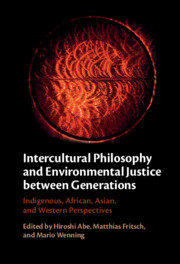 Intercultural Philosophy and Environmental Justice between Generations
Intercultural Philosophy and Environmental Justice between Generations Book contents
- Intercultural Philosophy and Environmental Justice between Generations
- Intercultural Philosophy and Environmental Justice between Generations
- Copyright page
- Contents
- Contributors
- Acknowledgments
- Introduction
- Part I Indigenous Philosophies on Justice between Generations
- Part II Intergenerational Ethics in Dialogue with Confucianism and Daoism
- 5 Ghosts and Intergenerational Justice
- 6 Intergenerational Ethics and Sustainability
- 7 Moral Motivation for Future Generations, Naturally
- 8 Transience, Responsible Transformation, and Deep Time in Daoist Thought
- Part III Humanity Facing the Near Environmental Future
- Index
- References
5 - Ghosts and Intergenerational Justice
A Confucian Perspective
from Part II - Intergenerational Ethics in Dialogue with Confucianism and Daoism
Published online by Cambridge University Press: 14 March 2024
- Intercultural Philosophy and Environmental Justice between Generations
- Intercultural Philosophy and Environmental Justice between Generations
- Copyright page
- Contents
- Contributors
- Acknowledgments
- Introduction
- Part I Indigenous Philosophies on Justice between Generations
- Part II Intergenerational Ethics in Dialogue with Confucianism and Daoism
- 5 Ghosts and Intergenerational Justice
- 6 Intergenerational Ethics and Sustainability
- 7 Moral Motivation for Future Generations, Naturally
- 8 Transience, Responsible Transformation, and Deep Time in Daoist Thought
- Part III Humanity Facing the Near Environmental Future
- Index
- References
Summary
This chapter engages with the world of ghosts and spirits (guishen 鬼神) in the classical Chinese tradition. While there has been agreement about the existence of ghosts, their status and the duties of currently living humans to them is all but clear. We argue that a Confucian innovation consists in acknowledging the existence of the spirit world in an “as if” mode. In this conception, humans share obligations of respect while they are well advised to practice attentive distancing to these beings. The mechanisms governing a haunted cosmos are ultimately beyond human comprehension. Ghosts are stand-ins and correctives who reveal the limits of human control and comprehension. We conclude by discussing the potential contributions of this Confucian conception of ghosts and spirits to contemporary debates on intergenerational justice.
- Type
- Chapter
- Information
- Intercultural Philosophy and Environmental Justice between GenerationsIndigenous, African, Asian, and Western Perspectives, pp. 97 - 114Publisher: Cambridge University PressPrint publication year: 2024
